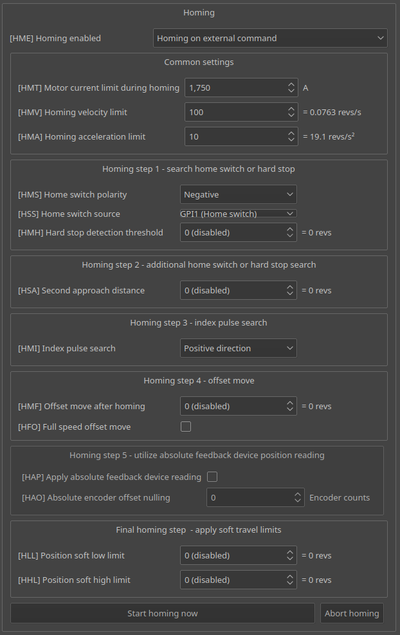Difference between revisions of "Homing"
From Granite Devices Knowledge Wiki
| [checked revision] | [checked revision] |
(Tag: VisualEditor) |
(→Homing methods) |
||
| Line 3: | Line 3: | ||
For example if linear axis is equipped with an incremetal [[Feedback devices|feedback device]], then position of the axis is not known by the machine after system power-on. To acquire absolute position, axis must be driven to known point (home point) where the position counter is zeroed. | For example if linear axis is equipped with an incremetal [[Feedback devices|feedback device]], then position of the axis is not known by the machine after system power-on. To acquire absolute position, axis must be driven to known point (home point) where the position counter is zeroed. | ||
==Homing methods== | ==Homing methods== | ||
| − | Most of Granite Devices drives support homing axis by combining different optional motion elements as a sequence: | + | [[File:granity_homing.png|400px|thumb|Homing settings in Granity 1.15.2]]Most of Granite Devices drives support homing axis by combining different optional motion elements as a sequence: |
#Move axis to search a home '''switch''' or mechanical '''end of travel''' (a.k.a. [[Hard-stop homing|hard-stop homing]]), direction and speed of motion is selectable. | #Move axis to search a home '''switch''' or mechanical '''end of travel''' (a.k.a. [[Hard-stop homing|hard-stop homing]]), direction and speed of motion is selectable. | ||
| − | #Then optionally move axis to user defined amount in used defined direction, and start search of home switch or mechanical end of travel '''one more time'''. This allows approaching the home always from the same direction eliminating the home switch hysteresis. The second approach is done at reduced 1/4 speed for higher positional repeatability. (1) | + | #Then optionally move axis to user defined amount in used defined direction, and start search of home switch or mechanical end of travel '''one more time'''. This allows approaching the home always from the same direction eliminating the home switch hysteresis. The second approach is done at reduced 1/4 speed for higher positional repeatability. This is configured by {{param|HSA}}. (1) |
#Then optionally move axis to search [[Feedback devices|feedback device]] '''index pulse'''. Index pulse provides very high position repeatability. Direction is selectable. | #Then optionally move axis to search [[Feedback devices|feedback device]] '''index pulse'''. Index pulse provides very high position repeatability. Direction is selectable. | ||
#Then optionally move axis to '''offset position'''. In practice user can enter a position value to drive where axis is driven after all previous homing functions are done. | #Then optionally move axis to '''offset position'''. In practice user can enter a position value to drive where axis is driven after all previous homing functions are done. | ||
#Then optionally set absolute position '''travel limits''' (soft limits). User may also set upper & lower bounds for position [[Setpoint signal|setpoint]] to possibly elimiate the need of axis limit switches. | #Then optionally set absolute position '''travel limits''' (soft limits). User may also set upper & lower bounds for position [[Setpoint signal|setpoint]] to possibly elimiate the need of axis limit switches. | ||
| − | + | The homing sequence can be saved in the drive and can be set to start automatically after power-on or on user ''start homing'' command. | |
(1) This step is supported only by selected drive models. Currently it is supported by IONI Pro series. | (1) This step is supported only by selected drive models. Currently it is supported by IONI Pro series. | ||
| + | |||
| + | {{tip|Homing is configurable through drive configuration software [[Granity]]. Refer to [[Granity: Goals]] for parameter details. }} | ||
==See also== | ==See also== | ||
Latest revision as of 18:20, 4 January 2021
Homing is a method for acquiring the absolute zero position of a mechanical axis to a known absolute position.For example if linear axis is equipped with an incremetal feedback device, then position of the axis is not known by the machine after system power-on. To acquire absolute position, axis must be driven to known point (home point) where the position counter is zeroed.
Homing methods[edit | edit source]
Most of Granite Devices drives support homing axis by combining different optional motion elements as a sequence:- Move axis to search a home switch or mechanical end of travel (a.k.a. hard-stop homing), direction and speed of motion is selectable.
- Then optionally move axis to user defined amount in used defined direction, and start search of home switch or mechanical end of travel one more time. This allows approaching the home always from the same direction eliminating the home switch hysteresis. The second approach is done at reduced 1/4 speed for higher positional repeatability. This is configured by Homing second approachHSA. (1)
- Then optionally move axis to search feedback device index pulse. Index pulse provides very high position repeatability. Direction is selectable.
- Then optionally move axis to offset position. In practice user can enter a position value to drive where axis is driven after all previous homing functions are done.
- Then optionally set absolute position travel limits (soft limits). User may also set upper & lower bounds for position setpoint to possibly elimiate the need of axis limit switches.
The homing sequence can be saved in the drive and can be set to start automatically after power-on or on user start homing command.
(1) This step is supported only by selected drive models. Currently it is supported by IONI Pro series.
| Homing is configurable through drive configuration software Granity. Refer to Granity: Goals for parameter details. |
